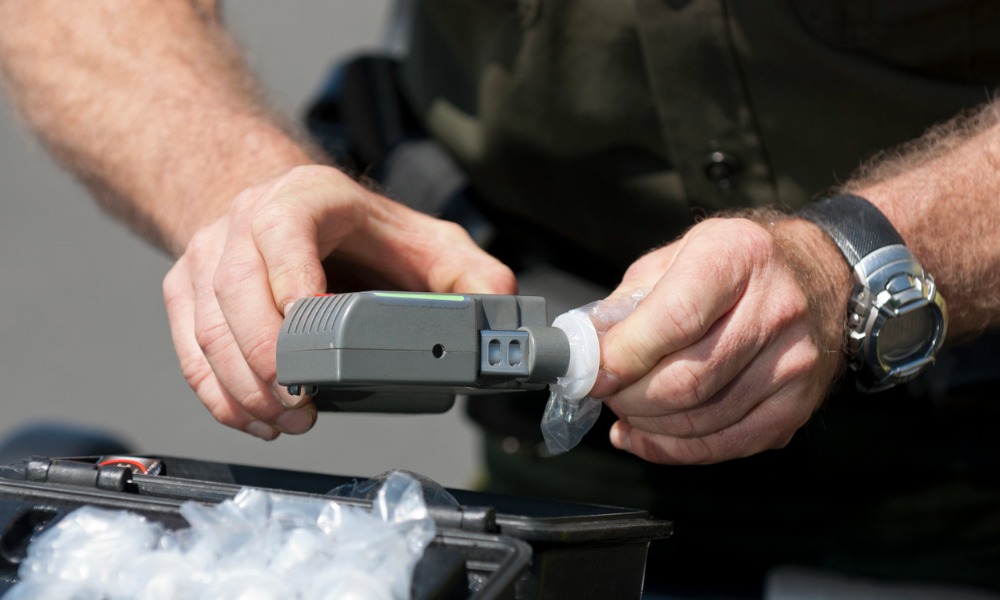
The court declined prosecutors' proposal to set a bright line rule for such incidents

A rule allowing people to refuse police officers’ alcohol breath sample demands, provided they later comply during the “same transaction,” applies not only to cases involving intoxilyzers but also those involving approved screening devices, the Ontario Court of Appeal ruled Tuesday.
What counts as a single transaction depends on the context of each situation, the appellate court added. The court rejected prosecutors’ argument that a bright line rule, which would take away a person’s right to refuse a breath sample test as soon as they are arrested, should be used instead to “promote certainty.”
“Different officers will inevitably draw the line at different points, based on their particular training and individual choices,” Justice Jonathan Dawe wrote. “Persons subjected to demands will have no way to predict exactly how much leeway they will be given to reconsider their initial decisions to refuse to comply.”
Such a scenario, Dawe said, “would have unacceptable and unfair consequences.”
Justices Katherine van Rensburg and Justice Thorburn concurred in R. v. Khandakar, 2024 ONCA 620.
The case stemmed from an incident in 2020 when police pulled over Shadman Khandakar after he left an Ontario bar. A police officer demanded that Khandakar provide an ASD breath sample, but Khandakar repeatedly refused and asked to be taken to the police station instead, where he believed he could provide a breath sample with a more reliable machine. The officer arrested Khandakar.
Ten minutes later, Khandakar learned he would not be allowed to use the machine at the police station and requested to use the ASD. The officer refused.
A trial court acquitted Khandakar, determining that his request to use the ASD was part of the same transaction in which he initially refused to provide police with a breath sample. To reach its conclusion, the trial court relied on the decision in a case called R. v. Domik, in which the Ontario Court of Appeal ruled “that an initial refusal will not be criminal if the accused later agrees to provide a breath sample as part of the ‘same transaction,’” Dawe wrote.
A summary conviction appeal judge upheld the trial court’s ruling. The Crown appealed, arguing Domik applies only to situations where people refuse intoxilyzer demands, not ASD demands.
The Court of Appeal disagreed, asserting that the framework under Domik applied to Khandakar’s case.
“It would be difficult as a matter of statutory interpretation to treat the essential elements of this offence as changing radically depending on which type of breath demand is at issue,” the appellate court said.
Dawe wrote that the length of time that counts as a single transaction cannot be delineated in a bright line, but any court evaluating an ASD refusal case needs to consider several factors to determine the length of a specific transaction window.
These include whether the individual who initially refused to provide a breath sample later complied “at a time where the police could still have lawfully obtained a breath sample.” The court should also consider a statutory requirement under the Criminal Code that the police obtain the sample “immediately,” as well as any unusual circumstances.
“If a trial judge determines that the accused’s change of mind occurred sufficiently soon after the initial refusal to form part of the ‘same transaction’, such that the police could still have lawfully obtained the breath sample, this will lead to the conclusion that the actus reus of the refusal offence has not been established,” Dawe wrote. “This will be so even if the initial refusal was expressed unequivocally.”
The trial and summary conviction appeal judges made legal errors when they failed to properly consider whether Khandakar’s agreement to provide the breath sample “fell within the time frame established by his statutory obligation to provide a breath sample ‘immediately,’” the appellate court said.
The court allowed the Crown’s appeal and ordered a new trial but declined to address Khandakar’s arguments that his acquittal should be upheld.
The Ontario Ministry of the Attorney General declined to comment on the case.
Bryan Badali, a partner at Lacy Naster LLP who represents Khandakar, says, “While we are disappointed with the outcome, and our client will continue to fight to clear his name, the decision confirms that a motorist’s initial refusal to blow into a screening device on the roadside is not conclusive of their guilt.”
Badali adds, “This is especially important since motorists in this situation are deprived of their right to counsel, and may not immediately understand their legal obligation to provide a sample.”